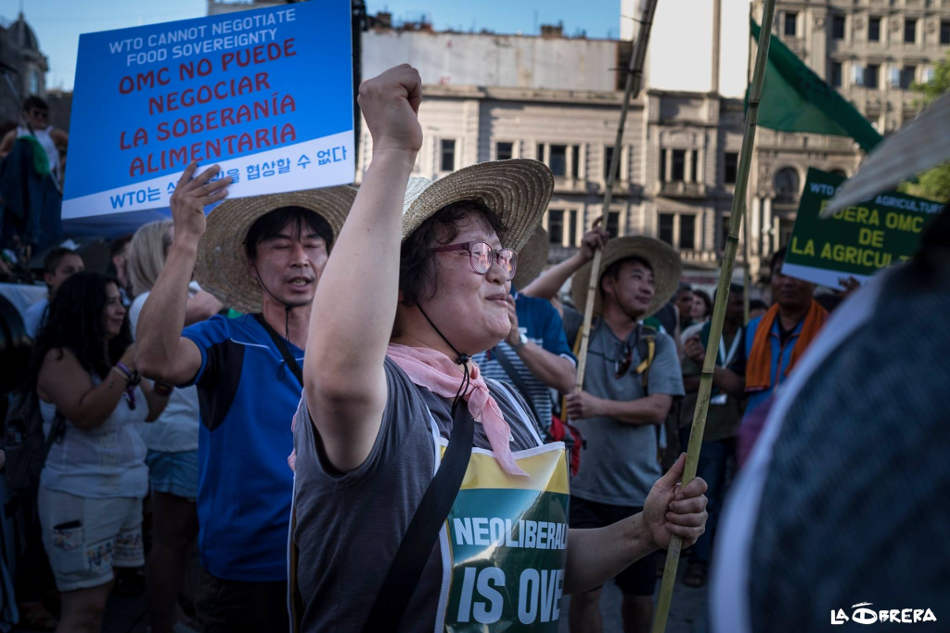“WTO MC11 talks collapse! Celebrating the Failure of WTO Negotiation in Argentina”

La Via Campesina and its allies strongly call for END of WTO/FTA trading system
26 December 2017: As part of the ‘2017 Week of Action Against the WTO’s 11th Ministerial Conference (MC11)’ in Argentina, hundreds of delegates from across La Via Campesina’s global network of peasant movements, together with allies, had converged in Buenos Aires earlier this month, demanding an end to the World Trade Organisation (WTO) and its global trade liberalisation regime.
With the outcomes of the 11th Ministerial Conference (MC11) considered a “total failure”, La Via Campesina celebrates this impasse while calling on all movements to remain vigilant at the same time. Negotiators of trade liberalisation will continue to seek out ways to attack peasant agriculture, traditional fisheries, and food sovereignty – be it through the WTO or any number of Free Trade Agreements (FTAs). La Via Campesina has always maintained its firm position of rejecting the WTO rather than proposing a reformation or tweaking of the rules of this institution.
In 2003, right outside the venue of the WTO ministerial conference in Cancun, Mexico – when our comrade and Korean farmer Lee Kyung Hae stabbed himself and took his life – he was still holding a banner that read – ‘WTO Kills farmers’ . During our week of action in Buenos Aires, we recalled his words and promised that his life and that of countless other peasants who have sacrificed themselves at the altar of free trade, will not be in vain. We will continue to resist WTO and not stop until it has been totally dismantled together with neoliberalism.
The MC11’s failure has reinforced our position that the WTO is undemocratic, without legitimacy and solely promotes the interests of big capital at the expense of peasants, rural workers, indigenous peoples, fishers, and mother earth. The draft text on agriculture was created in a totally undemocratic manner with only a few member states and has no legitimacy.
The key issue for developing countries and farmers at this ministerial was public stockholding which underpins the food sovereignty of each state – which is a country’s sovereign right to maintain public stocks of food in order to feed its people. These stocks are often procured from small holder farmers in the country and therefore the public stockholding programs are an important lifeline for economically poorer families and peasant communities around the world. Such programs must be amplified and scaled up across the world to achieve food sovereignty. Instead, WTO’s rules see these stocks and subsidies as trade distortions.
At the WTO’s Bali Ministerial (2013) countries decided on a “Peace Clause” until a permanent solution was found.1 This peace clause was problematic as it had many conditions attached to it. Getting an unconditional and permanent solution was a key demand of the developing countries in Buenos Aires. But, the U.S. simply refused to agree to even mention ‘permanent solution’ at MC 11, thus going back on its own promises in Bali. After a heavy tussle, no permanent solution was created and there is no deadline set yet. At the moment countries will continue with the peace clause. The confrontations at MC 11 makes it evident that the developed countries do not want developing countries to implement welfare programmes, which are meant to improve the lives of economically poorer people and peasant communities.
Having taken part in multiple protests, debates and discussions at the Peoples’ Summit – as well as by carrying out direct actions against the WTO and FTAs at the venue of MC11 – La Via Campesina reiterates its commitment to defeating the WTO wherever it pokes its horrific head. We warn, however, that a rise in bilateral and interregional “Free Trade” Agreements (FTAs) is as great a threat as the dying WTO. We must remain vigilant in our struggle for food sovereignty, demanding among other things more and better public policies that protect and promote peasant-led food systems based on food sovereignty principles.
In 2018 and beyond, the WTO will continue to threaten peasant agriculture and food sovereignty. We, therefore, as La Via Campesina will strongly continue the fight against the threats of WTO and FTAs and whoever demands trade liberalisation. We will fight for people’s Right to Food Sovereignty.
FOR FOOD SOVEREIGNTY!
WTO OUT OF AGRICULTURE!
LA VIA CAMPESINA
—————————————————————————————————-
FOR PRESS ENQUIRIES
-
French: Claude Girod – Confederación Campesina, La Vía Campesina, Francia. (54) 91121824509
-
English Kim Jeong Yeol – Asociación de Mujeres Campesinas de Korea – Comisión Coordinadora Internacional – La Vía Campesina, Korea. (54) 91138781935
-
Spanish: Deolinda Carrizo – Movimiento Nacional Campesino Indígena – Cloc – Vía Campesina, Argentina. (54) 91133489316
-
Nury Martínez – Federación Nacional Sindical Unitaria Agropecuaria – Fensuagro – Comisión Coordinadora Internacional – La Vía Campesina, Colombia.
FOR MORE INFORMATION
viacampesina.org | facebook.com/viacampesinaofficial | @via_campesina
1 The peace clause implied that even if a developing country gave subsidies amounting to more than 10% of production (based on the Agreement on Agriculture’s absurd formula which uses base levels of 30 years ago from 1986-88 reference price), other countries would not challenge the action at the WTO until after 2017.
